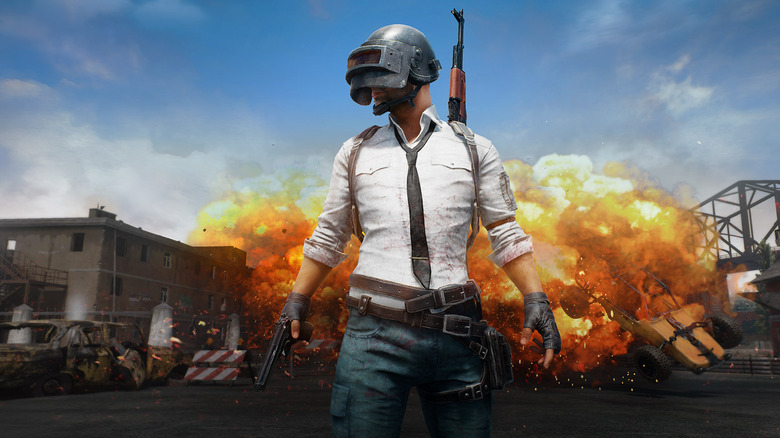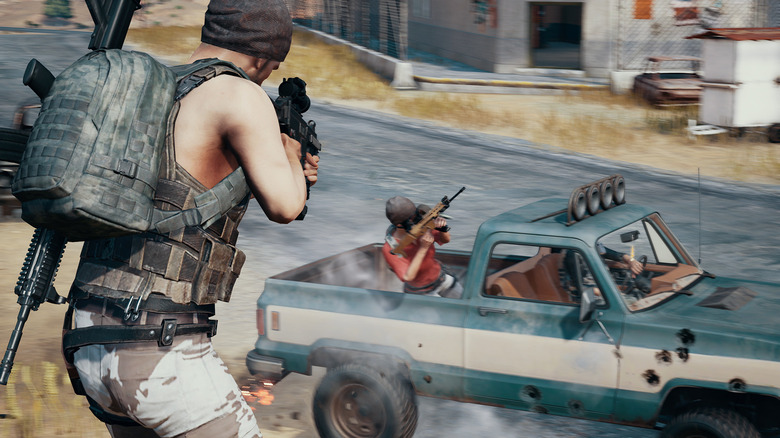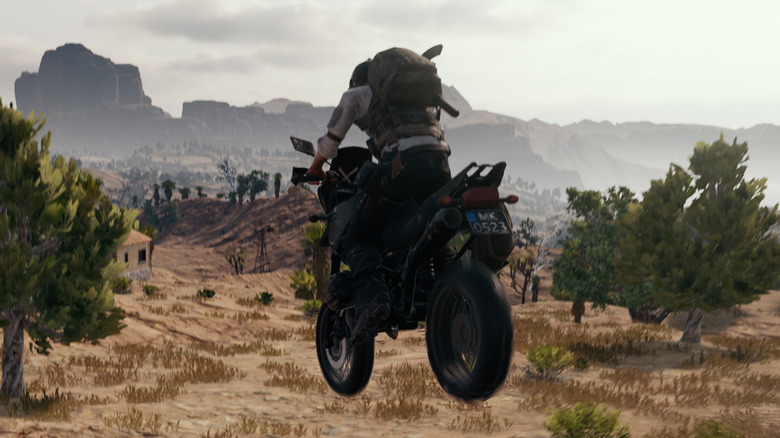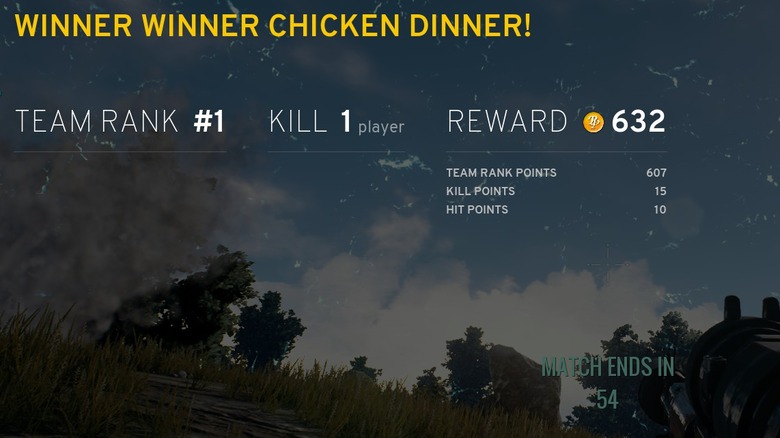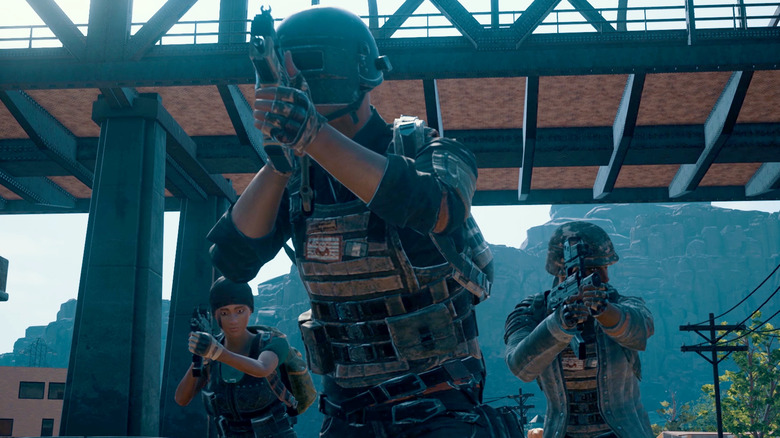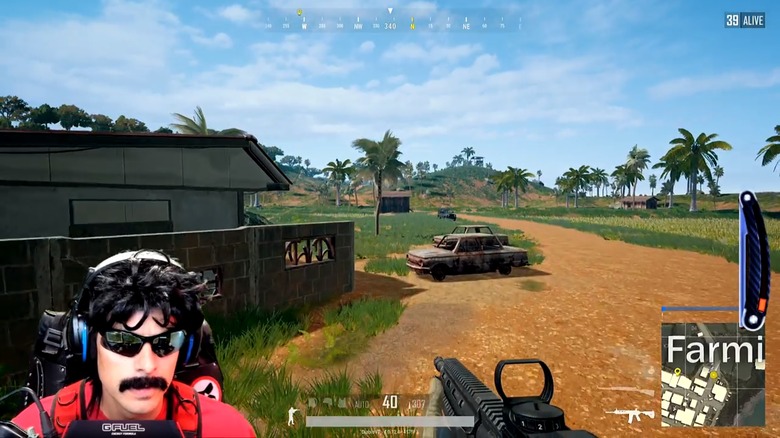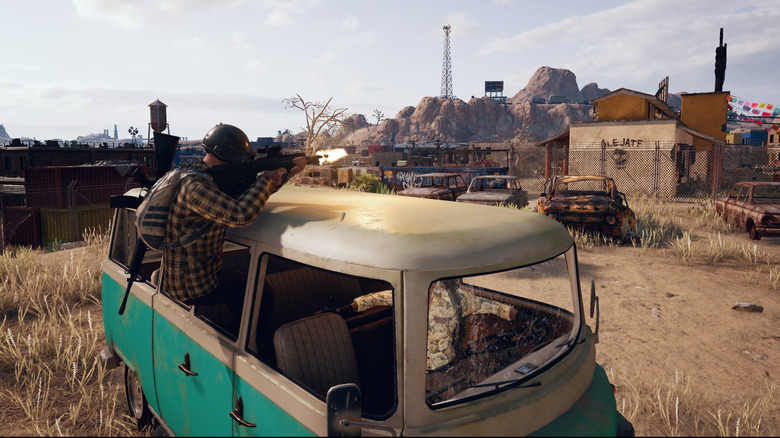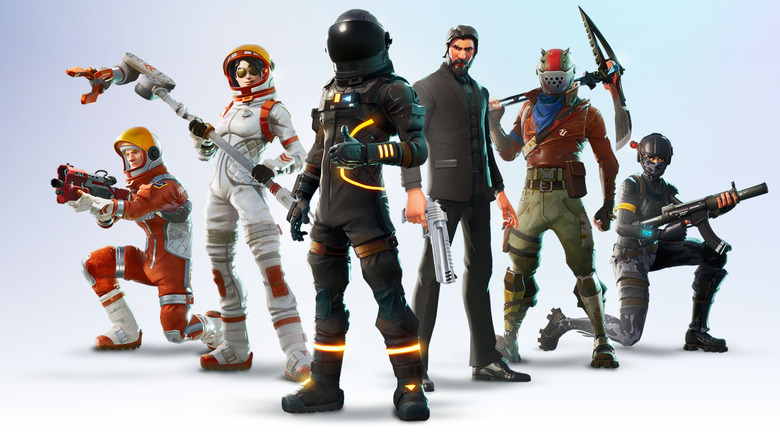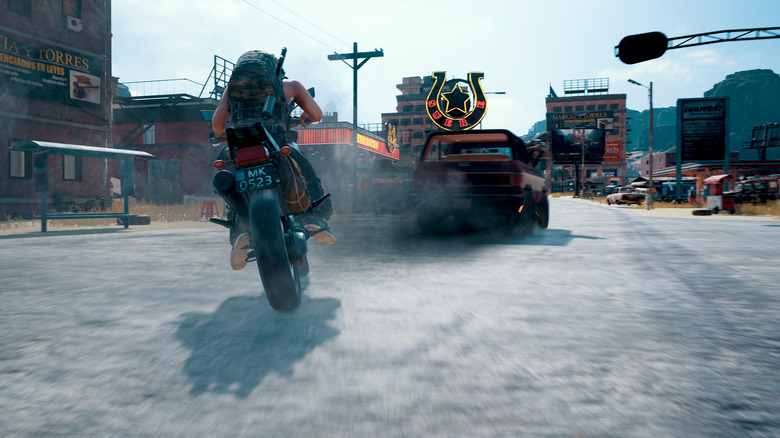The Untold Truth Of PlayerUnknown's Battlegrounds
It did not take long for PlayerUnknown's Battlegrounds (or PUBG, as it is more commonly known) to take the gaming world by storm. Steam Charts indicates that PUBG topped out at over three million concurrent players on Steam in January 2018, and it has continued to see millions of players in the months that followed; PUBG currently dominates the gaming landscape like few games ever have. Many games have followed in its footsteps and are looking to incorporate elements of the battle royale genre that PUBG brought into the mainstream. Kotaku and Venture Beat report that even huge, AAA franchises like Call of Duty and Battlefield are open to the possibility of battle royale modes.
Whether you live and breathe PUBG or you just can't understand why it is so darn popular, you cannot deny the impact the game has had on our pop culture landscape. Let's delve in and take a look at some of the most noteworthy aspects of PlayerUnknown's Battlegrounds since its release to Steam Early Access in March 2017.
Who is PlayerUnknown?
Brendan Greene is the man behind the PlayerUnknown moniker, and he actually fell into game development later than most. We tend to think of game developers as wunderkinds: those who grew up on the classics and start coding at a very early age. Rolling Stone reports that Greene actually began his career as a photographer and graphic designer, and he later utilized the design skills he had used creating webpages to get his start in game design.
However, Greene didn't start designing games until he was into his thirties, and even then he was developing mods for existing games like Arma 2 and its offshoot, DayZ. Kotaku reports that Greene's transformation of these popular shooters caused others in the industry to take notice, and Sony Online Entertainment (now known as Daybreak Game Company) brought him in to consult on what would become H1Z1: King of the Kill. This experience served as the groundwork for Greene's teaming with developer Bluehole for what would become PlayerUnknown's Battlegrounds.
Did PUBG start the battle royale genre?
Greene's called his mods for the Arma series and DayZ "Battle Royale;" Polygon reports that he named them after the 2000 Japanese film of the same name, which in turn was based on the 1999 book by Koushun Takami. The story follows a group of teenagers who are dropped on an island by the Japanese government and forced to fight to the death in a form of population control. His mods sought to replicate that "every man for himself" fight to the death that the Battle Royale book and movie created.
PlayerUnknown's Battlegrounds saw its release into Steam Early Access in March of 2017. Although it is easily one of the two most popular games in the battle royale genre (more on that later), PUBG is not the pioneer of the genre that many assume it to be. However, Greene is easily responsible for the genre's current market saturation. Greene's mod work for the Arma series and DayZ are widely regarded as the first true entries in the genre, and PUBG is culmination of that work. PlayerUnknown's Battlegrounds may not be the granddaddy, but PlayerUnknown most certainly is.
Skyrocketing up the Steam charts
It did not take long for gamers to take to PUBG. PC GamesN writes that it overtook League of Legends as the most streamed game on Twitch in August 2017. PUBG's randomness, cutthroat gameplay, ridiculous skill ceiling, and high stakes shootouts made it an intense experience to watch and play. With all the exposure the game was getting, despite still being in Early Access, it took over the Steam sales charts and concurrent players list.
Until the runaway popularity of PlayerUnknown's Battlegrounds, Dota 2, and Counter-Strike ruled the roost at the top of the Steam statistics page. According to IGN, PUBG caught up with Valve's juggernauts in August of 2017, and easily surpassed them the following month.
According to Steam Charts, since October of 2017, PlayerUnknown's Battlegrounds has averaged over a million players online at any given time. During that time, it has always peaked at well over two million concurrent players. It saw an even bigger increase once the game got its full release in December 2017, peaking at over three million concurrent players during that month and January 2018. It regularly sits atop Steam's statistics page; at the time of this writing, there are currently 2.3 million players online in PUBG.
What the heck is Winner Winner Chicken Dinner?
When a game of PlayerUnknown's Battlegrounds ends, you are shown a stats screen and the ability to watch the replay of how you were eliminated. Unless, of course, you happen to be skilled and lucky enough to be the last person (or team) standing. When you (if you ever) win a game of PlayerUnknown's Battlegrounds, you are awarded the message "Winner Winner Chicken Dinner" to honor the accomplishment. But just where does that odd phrase come from?
Deadspin investigated the phrase back in 2009. Apparently, it has roots to the Great Depression: many people turned to gambling in an attempt to raise a bit of money. The phrase reportedly was used because, if someone won a few games in a row, they could afford to buy chicken for dinner. The phrase stuck with those gambling roots and found a home in Las Vegas casinos, and Brendan Greene has been using it in his mods since the Arma 2 days, according to Kotaku.
Big money, big prizes
PlayerUnknown's Battlegrounds continued to dominate the gaming landscape, but that did not come without its fair share of controversy. According to Polygon, Greene repeatedly stated PUBG would not see true microtransactions until after the game left Early Access, yet Greene and Bluehole added loot boxes that could only be opened with keys in July of 2017. The loot boxes could be obtained just through playing the game, but the keys used to open them could only be purchased with real money.
Naturally, an angry fanbase followed. Greene issued an apology on Steam, but it was only for the poor communication and the microtransactions stayed put. Although the items are purely cosmetic in nature, the decision still left a lot of fans feeling betrayed. However, this controversy did little to dent PUBG's popularity.
In fact, PlayerUnknown's Battlegrounds has some of the most expensive items on the Steam marketplace. Those who preordered the game from the PlayerUnknown's Battlegrounds website received the "PlayerUnknown Set," which is listed on the Steam Marketplace starting at $1,150. Heck, "PlayerUnknown's Bandana," a single item from that set, starts listed at over $300. Those who play a lot of PUBG and have some luck with loot boxes can make a pretty penny off of their cosmetic items.
The Doctor is, briefly, not available
As PlayerUnknown's Battlegrounds continued to sit atop the front page of Twitch, a few streamers started to emerge due to their combination of personality and skill with the game. The most prominent of those streamers is one Guy Beahm, more commonly known as Dr. DisRespect. Dexerto reports that, in February of 2018, he broke Twitch's record for concurrent viewers with 388,000 people tuning in to watch him play PUBG. He is recognizable on sight by his black mustache, mirrored sunglasses, and curly mullet wig.
He is also recognizable for the over-the-top alpha male character he portrays, spouting ridiculous action movie cliches and disrespecting opponents as he talks a macho game. PC Gamer writes that, unfortunately for the Doctor, that personality got him into a bit of trouble with Greene.
While streaming a squad match in July 2017, Dr. DisRespect shot and killed his teammate because there was not room for the entire squad on an in-game motorcycle. It was a joke as part of his character, but team killing is strictly against PUBG's rules. Dr. DisRespect was given a temporary ban for the play, and began to banter on Twitter with Greene. He was shut down when he threatened violence against Greene — most people assume it was a joke and, despite being part of his DisRespect's character, Greene took to TwitLonger to issue a lengthy statement about why threats of violence are a serious issue.
Nobody likes a cheater
With any competitive multiplayer game, cheating always becomes an issue. Due to the visibility and money available in a game as popular as PlayerUnknown's Battlegrounds, cheating is a gigantic problem. The amount of players that have been banned from PUBG is more than enough proof.
PUBG uses an anti-cheat software from BattlEye, as well as allowing players to report suspicious activity through deathcam replays. When the game was released out of Early Access, BattlEye took to Twitter to announce a statistic indicating that they had banned over one and a half million accounts in 2017. With the game's full release, that number increased exponentially. They announced that they banned just over one million PUBG accounts in January 2018 alone, and stated "things continue to escalate."
In addition to reporting and banning cheaters, Greene and the other developers of PlayerUnknown's Battlegrounds have taken to stopping cheaters outside of the realm of the game. PC Gamer writes that Tencent, a gaming company that distributes the game to players in China, helped local authorities track down and arrest around 120 people for developing cheating software for PUBG. It just goes to show: cheaters lose out in the end.
Dropping the review bomb
The development of cheating software is not the only issue that sprung from PlayerUnknown's Battlegrounds' release in China. Shortly after Tencent brought PUBG to China, negative reviews started hitting the game's Steam page. And we aren't talking just a few; Game Rant reports that PUBG was hit with 20,000 negative reviews over just a few days' time.
Polygon defines a review bomb as "an act of aggression, a step meant to send a message of extreme discontent with the actions of a particular developer." A full-fledged detonation was happening on PUBG's Steam review page due to connectivity issues and a poorly placed advertisement.
Kotaku reports that China's PUBG servers were regularly seeing ping upwards of 500. For any shooter, ping over 100 makes the game nearly impossible to succeed at due to the lag. At the same time, an "internet accelerator" company called XunYou was advertising a VPN service on PUBG's homepage. This felt like a slap in the face, as some players felt like they were being extorted in order to actually enjoy the game. The server lag coupled with the advertisement incensed many players, leading to the massive wave of negative reviews.
PUBG vs. Fortnite
We've managed to avoid the elephant in the room, but we can't talk about PUBG without talking about Fortnite. On first glance, the two look extremely different: PlayerUnknown's Battlegrounds is all tans and natural colors, while Fortnite's bright hues pop off the screen. PUBG goes for a patient, realistic style, while Fortnite has players dancing atop missiles while sniping opponents dressed as pink unicorns.
Players are adamant about which game is better, standing by their choice despite any criticism from the other side. The fan vitriol has even spilled over to developers: The Verge writes that Bluehole has gone on the record that they were concerned about Fortnite "replicating the experience for which PUBG is known." Seeking Alpha writes that Bluehole has, in the past, brought up copyright infringement lawsuits against other similar games.
That's why it wasn't such a surprise when, in May 2018, Bluehole subsidiary PUBG Corp filed a copyright infringement suit against Epic Games in South Korean court, according to a report in the Korea Times. While fans braced for the two gaming rivals to have a battle royale of their own in a courtroom, the resolution was decidedly anti-climactic: according to Polygon, PUBG Corporation quietly dropped the lawsuit the very next month. As of this writing, no one knows why the lawsuit disappeared, but the monthlong tease of legal action represents yet another strange twist in the ongoing clash between the two games.
What's in store for PUBG?
PlayerUnknown's Battlegrounds still has a lot of space to grow, even with its release out of Steam Early Access in December 2017. PUBG Corporation, an offshoot of Bluehole that was born from the game's insane popularity, released a roadmap of what they hope to do with the game in its first true year of release.
Steam achievements and weapon skins were added to the game in April 2018. New maps, and an ability to select maps prior to jumping into a game, will change how players approach each round. An emote system is coming. Standard quality of life improvements, such as improved sound and in-game textures, are being added as well.
The company's roadmap also indicates that they are continuing to optimize PUBG for the realm of eSports. They state that they feel the game itself is ready for competitive gaming, but they recognize that the spectator element still needs work to truly make PUBG an eSports contender. They are pushing an improved ranking system as well as working on improvements to the 3D replay system to help build that foundation.

